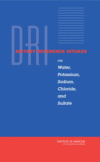
Wed, Feb-11-04, 12:25
|
 |
Registered Member
Posts: 40
|
|
Plan: Atkins, now SB
Stats: 142/128/110

BF:
Progress: 44%
Location: Pittsburgh, PA, USA
|
|
 water and the Institute of Medicine
water and the Institute of Medicine
For those of you who are having trouble gulping your daily water intake every day here is a new report out that you might find interesting.It's mostly on salt and potassium, but it also says that you dont need to count water as was previously thought, and that caffinated beverages count too...
Dietary Reference Intakes: Water, Potassium, Sodium, Chloride, and Sulfate



Project: Dietary Reference Intakes for Electrolytes And WaterPublished On: February 11, 2004 



The Food and Nutrition Board is releasing the sixth in a series of reports presenting dietary reference values for the intake of nutrients by Americans and Canadians. This new report establishes nutrient recommendations on water, salt and potassium to maintain health and reduce chronic disease risk. Highlights of the report include: - The vast majority of healthy people adequately meet their daily hydration needs by letting thirst be their guide. The report did not specify exact requirements for water, but set general recommendations for women at approximately 2.7 liters (91 ounces) of total water -- from all beverages and foods -- each day, and men an average of approximately 3.7 liters (125 ounces daily) of total water. The panel did not set an upper level for water.
- About 80 percent of people's total water intake comes from drinking water and beverages -- including caffeinated beverages -- and the other 20 percent is derived from food.
- Prolonged physical activity and heat exposure will increase water losses and therefore may raise daily fluid needs, although it is important to note that excessive amounts can be life-threatening.
- Healthy 19- to 50-year-old adults should consume 1.5 grams of sodium and 2.3 grams of chloride each day -- or 3.8 grams of salt -- to replace the amount lost daily on average through sweat and to achieve a diet that provides sufficient amounts of other essential nutrients.
- The tolerable upper intake level (UL) for salt is set at 5.8 grams per day. More than 95 percent of American men and 90 percent of Canadian men ages 31 to 50, and 75 percent of American women and 50 percent of Canadian women in this age range regularly consume salt in excess of the UL.
- Older individuals, African Americans, and people with chronic diseases including hypertension, diabetes, and kidney disease are especially sensitive to the blood pressure-raising effects of salt and should consume less than the UL.
- Adults should consume at least 4.7 grams of potassium per day to lower blood pressure, blunt the effects of salt, and reduce the risk of kidney stones and bone loss. However, most American women 31 to 50 years old consume no more than half of the recommended amount of potassium, and men's intake is only moderately higher.
- There was no evidence of chronic excess intakes of potassium in apparently health individuals and thus no UL was established.


|

